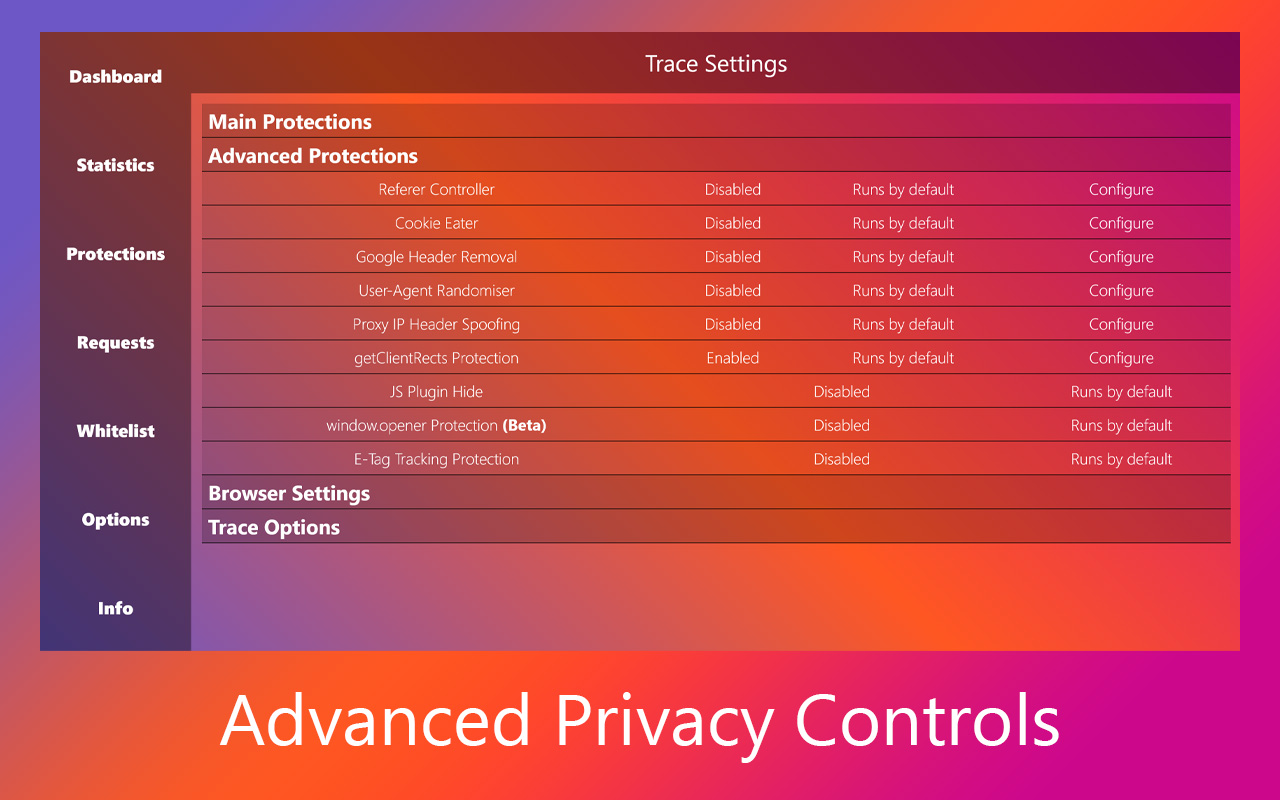QUESTION to be answered and justified: what is the most effective adblocker extension?
This weekend I finished a project for my study , before delivering it on Tuesday (tomorrow) I would like to share my findings with this forum. Please don’t hesitate to post your opinion or experiences.
Background:
Which extensions to evaluate?
Community powered and brute force, refer to the syntax based blockers AddBlockPlus and uBlockOrigin which mostly use (bottom-up) community based blacklist (e.g. Easylist, Fanboy etc). uBo and ABP both offer syntax to block or hide HTML and CSS (stylesheets) elements. uBO tops this with redirect options and javascript (scriptlet) injections and its own dynamic filtering.
Data driven and less is more are represented by Disconnect and Ghostery. Both Disconnect and Ghostery use small (top-down) defined blocklist. Privacy Possum uses behavioral monitoring to discover trackers and uses a small black/grey/whitelist. Latest Ghostery also discovers unlisted trackers using behavioral analysis.
Which extension is the most effective?
This answer is always related to the websites which are used to test the effectiveness against. So there is no objective answer to that. When you read tests of Gorhill uB0 comes out as best, when you read tests of Adguard, adguard is best, et cetera. By choosing which websites are used to test the effectiveness of an adblocker, one can manipulate the results. So best test / study I could find is block_me_if_you_can which is performed by SBA-research.org an organization related to respected Austrian universities and used 100.000 websites from Alexa top 200.000 which did not require log-in or were 'walled'in any other way. https://www.sba-research.org/wp-content/uploads/publications/block_me_if_you_can.pdf
The winners are Ghostery and uBlockOrigin according to this study

Note 1: study is from April 2017 where uBO version 1.7 was tested. uBO now also blocks and redirect analytics and tagmanagers, so current uBo should block more analytics and tagmanagers (light and dark green category in the uBO column).
Note 2: this score was obtained after Privacy badger was trained with 1000 websites. Latest version of Privacy Badger seems to block more trackers out of the box).
Note 3: When you look at Gorhill’s own research (link), uBlockOrigin in very easy mode (similar to AdblockPlus with acceptable ads disabled) roughly blocks half of the thord-party request compared to uBO in default mode (easy mode).
Less is more when you go with the flow (browse mainstream websites).
At first sight it seems that smaller blacklist (Disconnect, Ghostery, Privacy badger) are more effective than large blacklist (ADBlockPlus and uBlockOrigin).
Member Windows_Security always stated that only a limited number of advertisement and tracking networks exist (because it takes money and resources to develop such a platform). This study seems to back Windows_Security claim
Big is beautiful, when you wander to websites using longtail tracking technology
Ironically this 80-20 rule of the Pareto principle keeps alive smaller advertising and tracking companies, because the adblock extensions block the large players.

All pigs are equal but some pigs are more equal
All extensions were tested on default values, except Ghostery which they had enabled blocking of all trackers (current default only Advertising, Analytics and Adult ads). This is disappointing in this test, when you test AdBlocking extensions on their capibilities, these should all be tested under the same conditions. So this study might has given an competitive advantage to Ghostery by testing it on tweaked settings. Important notice: when using Ghostery be sure to open settings and click on OPT-in/OPT-out and disable all opt-ins. For better protection it might be a good idea to block social trackers also (Ghostery allows trackers on own websites, so it allows facebook trackers on facebook website).
QUESTIONS IN NEXT POST
This weekend I finished a project for my study , before delivering it on Tuesday (tomorrow) I would like to share my findings with this forum. Please don’t hesitate to post your opinion or experiences.
Background:
- This project is an exercise in finding and analyzing field data. With so much data available on the internet, it is easy to find proof for nearly any hypothesis or assumption. The existence of troll and click farms and option to advertise politically tinted ideas on social media makes it hard to determine whether something is true or not.
- The research question (what is the best adblocker) is chosen as a topic because it resembles the context of shady discussion on the internet:
- Most people don’t understand underlaying technology (so can’t recognize fake from real information)
- most people don’t really care about privacy (so they won’t dig into the issue themselves)
- when asked explicitly most people to be “against” advertisements and trackers
- when explained most people prefer free (with ads) over paid (without ads)
- there is an active community against ads and a powerful business industry in favor of ads
Which extensions to evaluate?
Community powered and brute force, refer to the syntax based blockers AddBlockPlus and uBlockOrigin which mostly use (bottom-up) community based blacklist (e.g. Easylist, Fanboy etc). uBo and ABP both offer syntax to block or hide HTML and CSS (stylesheets) elements. uBO tops this with redirect options and javascript (scriptlet) injections and its own dynamic filtering.
Data driven and less is more are represented by Disconnect and Ghostery. Both Disconnect and Ghostery use small (top-down) defined blocklist. Privacy Possum uses behavioral monitoring to discover trackers and uses a small black/grey/whitelist. Latest Ghostery also discovers unlisted trackers using behavioral analysis.
Which extension is the most effective?
This answer is always related to the websites which are used to test the effectiveness against. So there is no objective answer to that. When you read tests of Gorhill uB0 comes out as best, when you read tests of Adguard, adguard is best, et cetera. By choosing which websites are used to test the effectiveness of an adblocker, one can manipulate the results. So best test / study I could find is block_me_if_you_can which is performed by SBA-research.org an organization related to respected Austrian universities and used 100.000 websites from Alexa top 200.000 which did not require log-in or were 'walled'in any other way. https://www.sba-research.org/wp-content/uploads/publications/block_me_if_you_can.pdf
The winners are Ghostery and uBlockOrigin according to this study
Note 1: study is from April 2017 where uBO version 1.7 was tested. uBO now also blocks and redirect analytics and tagmanagers, so current uBo should block more analytics and tagmanagers (light and dark green category in the uBO column).
Note 2: this score was obtained after Privacy badger was trained with 1000 websites. Latest version of Privacy Badger seems to block more trackers out of the box).
Note 3: When you look at Gorhill’s own research (link), uBlockOrigin in very easy mode (similar to AdblockPlus with acceptable ads disabled) roughly blocks half of the thord-party request compared to uBO in default mode (easy mode).
Less is more when you go with the flow (browse mainstream websites).
At first sight it seems that smaller blacklist (Disconnect, Ghostery, Privacy badger) are more effective than large blacklist (ADBlockPlus and uBlockOrigin).
Member Windows_Security always stated that only a limited number of advertisement and tracking networks exist (because it takes money and resources to develop such a platform). This study seems to back Windows_Security claim
study said:We found that the great majority of third-party services belongs to a relatively small number of large Internet players
Big is beautiful, when you wander to websites using longtail tracking technology
Ironically this 80-20 rule of the Pareto principle keeps alive smaller advertising and tracking companies, because the adblock extensions block the large players.
When breaking down the effectiveness of large (bottom-up community) based blocklist versus small (expert top-down) blocklist, it shows that uBlockOrigin is more effective against smaller tracking companies (seen only at less than 20 websites in the Alexa top 200.000). uBO has out of the box, more block rules than any other adblocker tested in this research.study said:Our results indicate that smaller tracking companies are able to avoid attention from blocking tools and thus persist regardless of the presence of tracker-blocking extensions.
All pigs are equal but some pigs are more equal
All extensions were tested on default values, except Ghostery which they had enabled blocking of all trackers (current default only Advertising, Analytics and Adult ads). This is disappointing in this test, when you test AdBlocking extensions on their capibilities, these should all be tested under the same conditions. So this study might has given an competitive advantage to Ghostery by testing it on tweaked settings. Important notice: when using Ghostery be sure to open settings and click on OPT-in/OPT-out and disable all opt-ins. For better protection it might be a good idea to block social trackers also (Ghostery allows trackers on own websites, so it allows facebook trackers on facebook website).
QUESTIONS IN NEXT POST
Last edited:





